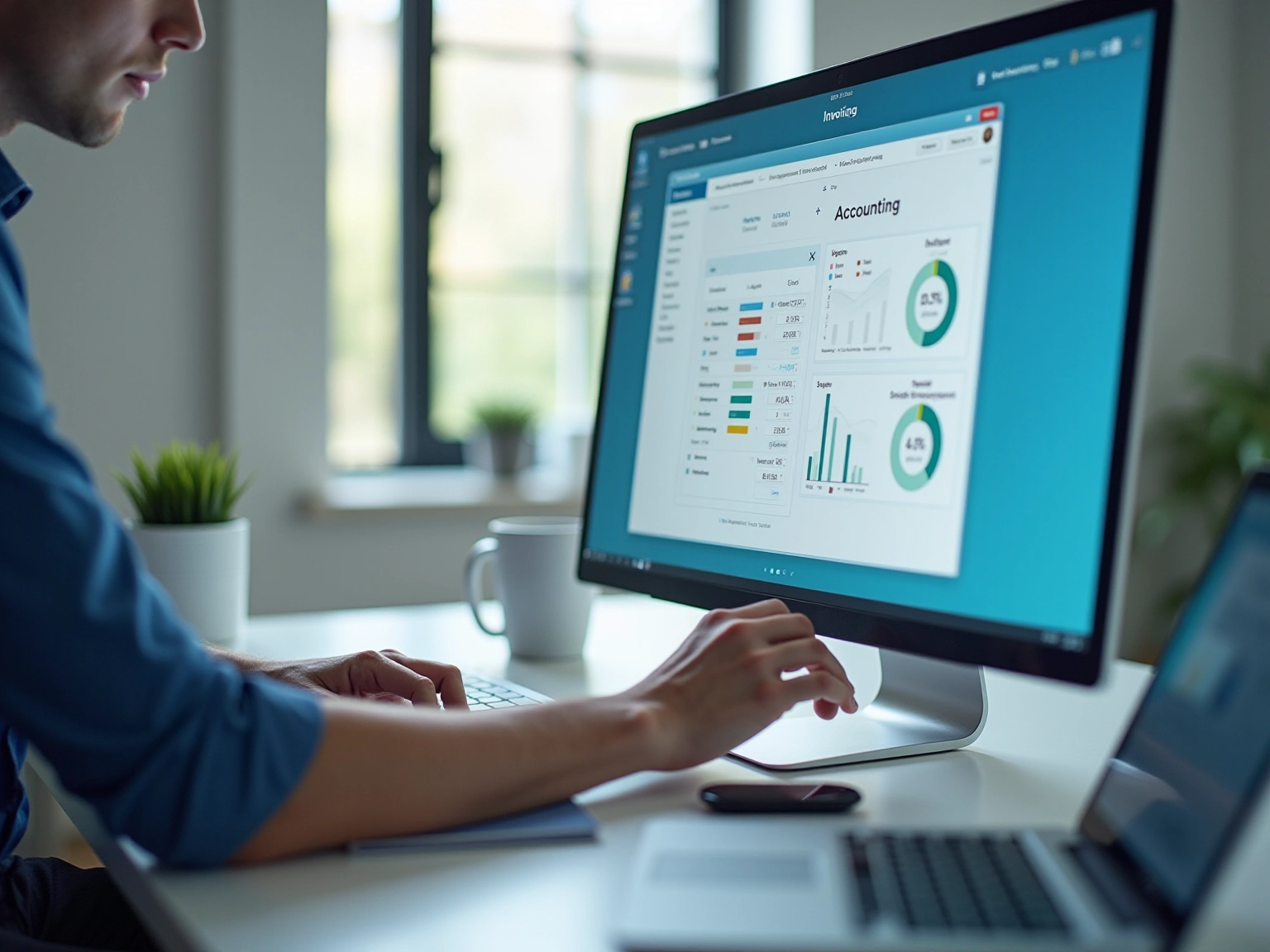Overview
An effective accounting system is paramount for small business success, as it adeptly manages resources, ensures tax compliance, and enhances financial performance. By leveraging features such as automation, reporting tools, and user-friendly integration, businesses can achieve remarkable operational efficiency. Selecting the right system requires careful evaluation of key factors, including:
- Business size
- Budget
- Customer support
Real-world examples illustrate the transformative impact of effective accounting solutions on operational efficiency and decision-making. Therefore, it is crucial for small businesses to invest in a system that not only meets their current needs but also positions them for future growth.
Key Highlights:
- An efficient accounting system is crucial for small businesses to manage resources, track income/expenses, and ensure tax compliance.
- Implementing a robust bookkeeping solution can enhance financial performance and decision-making capabilities.
- The demand for bookkeeping and auditing roles is expected to grow by 4% from 2022 to 2032, highlighting the need for organized financial management.
- Key factors for selecting an accounting system include business size, budget, ease of use, integration capabilities, and customer support.
- Features to evaluate in accounting software include core accounting functions, automation, reporting tools, mobile access, and compliance features.
- Real-world examples show that businesses using effective accounting systems experience improved client engagement and operational efficiency.
- Comparative analysis of accounting systems should involve creating charts, reading user reviews, requesting demos, evaluating pricing, and considering scalability.
- Testing software options through free trials and involving team feedback is essential before making a commitment to an accounting system.
- The global market for financial software is projected to reach $11.8 billion, indicating a rising need for tailored financial solutions for small businesses.
Introduction
In the ever-evolving realm of small business management, the importance of a robust accounting system is paramount. As companies grapple with the complexities of financial management, a well-structured accounting framework emerges as a critical driver of growth and a safeguard for compliance with shifting regulations. This article explores the essential components of selecting an effective accounting solution, emphasising key factors such as:
- Budget considerations
- User-friendliness
- Integration capabilities
Moreover, it examines the indispensable features that modern accounting software should encompass—ranging from automation to mobile access—empowering businesses to streamline operations and enhance decision-making. By analysing real-world examples and offering actionable insights, this comprehensive guide equips small business owners with the knowledge necessary to make informed decisions in their quest for financial success.
Understand the Importance of an Accounting System
Understanding the importance of the best accounting system for small businesses is crucial for small enterprises, as it provides a structured approach to resource management. Accountants frequently encounter challenges, including the time-consuming task of gathering information from various sources and the risk of misplaced responses amidst busy email threads. An efficient bookkeeping system is recognised as the optimum accounting solution for small businesses, enabling precise tracking of income and expenses, facilitating the creation of financial reports, and ensuring compliance with tax regulations. By adopting a comprehensive record-keeping solution, companies can gain valuable insights into their financial performance, identify trends, and make informed decisions that foster growth. Furthermore, implementing the best accounting system for small businesses significantly reduces errors and saves time, allowing business owners to concentrate on essential operations rather than becoming overwhelmed by paperwork.
The anticipated growth in bookkeeping and auditing positions, projected to rise by 4% from 2022 to 2032, underscores the importance of organised resource management in small enterprises. As financial regulations and reporting become increasingly complex, the demand for the best accounting system for small businesses becomes ever more critical.
Real-world examples demonstrate the benefits of organised record-keeping systems. Small enterprises that have embraced the best accounting system for small businesses report enhanced financial performance and improved decision-making capabilities. Understanding the costs associated with bookkeeping services—ranging from $20 to $100 per hour—can assist small business owners in effective budgeting and seeking appropriate financial support. This knowledge is vital for developing sound financial strategies that align with their operational objectives. Moreover, tools like Glasscubes can significantly improve client engagement by streamlining communication and information requests. Unlike traditional email, which often results in misplaced or overlooked information, Glasscubes provides automated reminders and real-time visibility into outstanding queries. This ensures that accountants can manage requests efficiently, fostering confidence in their services. As the global market for financial software is projected to reach $11.8 billion in the next eight years, the need for tailored financial solutions is on the rise. This shift highlights the necessity for small enterprises to implement the best accounting system for small businesses, which not only optimises operations but also supports long-term financial success. The expectation that automated and intelligent financial systems will profoundly impact financial enterprises over the next 30 years further emphasises the need for small firms to embrace these advancements. Ultimately, organised financial management is essential for small enterprises striving to thrive in a competitive landscape.

Identify Key Factors for Selection
When selecting an accounting system, it is essential to consider several key factors that can significantly influence your company’s success:
- Business Size and Complexity: Evaluate whether the system can accommodate your current operations and future growth. Choosing the best accounting system for small businesses that scales with your operations is vital for long-term efficiency.
- Budget: Set a clear budget for accounting applications, taking into account initial setup costs and ongoing expenses. A strategic allocation of resources can prevent overspending while ensuring you have the necessary tools.
- Ease of Use: Opt for applications with a user-friendly interface that minimises the need for extensive training. Glasscubes, for instance, provides an effortless onboarding experience with no training required, allowing for quick adoption among staff and reducing the learning curve.
- Integration Capabilities: Ensure that the application can seamlessly connect with existing tools, such as CRM systems or inventory management programmes. This interoperability enhances workflow efficiency and data accuracy.
- Customer Support: Evaluate the level of support offered by the vendor, including training resources and technical assistance. Glasscubes provides customised support packages, ensuring reliable customer service that is crucial for addressing issues promptly and maintaining operational continuity.
The importance of selecting the best accounting system for small businesses is underscored by a recent study involving 60 participants, where 56 reported utilising financial management systems, highlighting its widespread adoption in the sector. Furthermore, companies that have implemented the best accounting system for small businesses, such as Glasscubes, have experienced remarkable outcomes, including a 40% increase in client response rates and a 50% reduction in response times. The automated reminder feature of Glasscubes enhances client engagement by streamlining communication, allowing for unlimited reminders and customised messages that keep clients informed and responsive. These results not only demonstrate the effectiveness of strategic tool selection but also emphasise how the right resources can enhance operational efficiency and client engagement, ultimately contributing to your business’s success.
Evaluate Essential Features of Accounting Software
When assessing financial programmes, it is crucial to consider the following essential features:
- Core Accounting Functions: The software must encompass fundamental functionalities such as invoicing, expense tracking, and reporting, which are critical for effective resource management.
- Automation: Look for features that automate repetitive tasks, including invoice generation and payment reminders. Automation not only saves time but also minimises the risk of human error, allowing accountants to concentrate on more strategic activities. For instance, Glasscubes offers a flexible automated reminder feature that allows users to send up to 10 reminders on a simple schedule or an unlimited number of reminders with advanced options on customisable schedules, thereby enhancing client engagement. This capability is particularly beneficial, as 58% of accounting professionals are expected to adopt artificial intelligence solutions for automating accounting tasks within the next three years, underscoring the growing trend toward automation in the industry.
- Reporting and Analytics: Robust reporting tools are essential for analysing financial data and generating actionable insights. This capability enables businesses to make informed decisions based on real-time data.
- Mobile Access: With the increasing demand for flexibility, ensure the system provides mobile capabilities. This allows you to manage finances on the go, enhancing productivity and responsiveness. Notably, 94% of financial managers utilised cloud services in the USA in 2019, indicating a strong trend toward mobile and cloud-based solutions.
- Compliance Features: The application should assist in upholding adherence to tax regulations and reporting standards, which is vital for preventing penalties and ensuring precise reporting.
In 2025, more than 50% of accounting leaders anticipate that automated accounting systems will greatly influence enterprises in the next 30 years. These trends highlight the significance of choosing applications that not only meet present requirements but also equip companies for future technological advancements. Case studies reveal that 44% of firms require a week or longer to consolidate multiple entities, emphasising the challenges in timely reporting. By utilising the best accounting system for small businesses, which includes essential features provided by Glasscubes, such as user-friendly onboarding and exceptional customer support, small businesses can streamline their processes, enhance efficiency, and improve overall financial management.

Compare Available Accounting Systems
To effectively compare the best accounting system for small businesses, consider the following steps:
- Create a Comparison Chart: Compile a list of the application options you are evaluating, detailing their key features side by side. This visual representation will help you identify strengths and weaknesses at a glance.
- Read User Reviews: Seek feedback from fellow small business owners to assess user satisfaction and uncover potential issues. Platforms like TrustRadius, which sees over 1 million monthly visits, provide detailed reviews that can guide your decision-making process. TrustRadius has emerged as a premier resource for evaluating the best accounting system for small business applications, offering insights that are essential for making informed decisions.
- Request Demos: Utilise free trials or demonstrations to experience the application firsthand. This allows you to evaluate usability and determine if it meets your specific needs. For instance, Glasscubes offers on-demand demos that showcase how it streamlines information gathering and enhances client engagement, helping firms achieve faster response times.
- Evaluate Pricing Plans: Compare the pricing structures of each programme, paying attention to any hidden fees associated with additional features or support. Understanding the total cost of ownership is crucial for budgeting, especially when choosing the best accounting system for small business.
- Consider Scalability: Ensure the software can adapt as your business grows, accommodating increased transactions and users. More than 50% of financial executives expect that the advancement of automated and intelligent systems will greatly impact financial practises in the upcoming years. This makes scalability a vital consideration, especially as technology literacy becomes increasingly important for accountants, with 57% emphasising it as a primary additional skill (Sage, 2020), particularly when evaluating the best accounting system for small business, which can be streamlined through tools like Glasscubes. With features such as automated reminders and efficient document collection, Glasscubes addresses common challenges faced by accountants, making it easier to gather necessary information and enhance client engagement. As noted by users, the platform has improved communication and transparency, allowing audit teams to manage client interactions more effectively and receive quicker responses.
Test Software Options Before Committing
Before committing to a financial system, thorough testing of your options is crucial.
-
Utilise Free Trials: Most accounting application providers offer free trials. Take advantage of this opportunity to explore the programme’s features and user interface, ensuring it aligns with your business needs. For instance, Glasscubes offers a 30-day free trial of its secure file sharing platform, allowing you to assess its fit for your firm without any initial commitment. After the trial, you can choose between a month-to-month commitment or an annual subscription for cost savings.
-
Involve Your Team: Gather feedback from team members who will use the application daily. Their insights are invaluable in assessing whether the application meets practical requirements and enhances workflow.
-
Test Key Features: Focus on the functionalities that matter most to your business, such as invoicing, reporting, and integration capabilities. This targeted method guarantees that the best accounting system for small business can effectively support your operations. Additionally, consider how automation features can reduce paperwork and increase efficiency, as seen in the automation of accounts payable, which can cut down 90-95% of paperwork and boost efficiency by 20-27%. Glasscubes’ client portals, for example, have demonstrated a 38% increase in responses to client requests for information, significantly enhancing engagement.
-
Assess Customer Support: During the trial period, engage with customer support to evaluate their responsiveness and helpfulness. Effective support can significantly impact your experience with the software.
-
Make a Decision: After testing, compile your findings and consider the feedback from your team. This thorough review will assist you in making a knowledgeable choice that aligns with your firm’s goals.
In 2025, the significance of evaluating the best accounting system for small business before acquisition is emphasised by the fact that practises generally obtain an average of 31 new clients, with larger firms attracting even more. This growth emphasises the necessity for the best accounting system for small business that can expand alongside your business. Moreover, industry specialists highlight the importance of free trials, mentioning that they enable companies to reduce risks linked to technology investments. As companies encounter difficulties in keeping pace with legislative changes, choosing flexible solutions becomes essential. Case studies, such as those from Glasscubes, demonstrate significant time savings and increased client response rates, showcasing how effective software can enhance workflow and client engagement.

Conclusion
Implementing a robust accounting system is not merely a necessity; it represents a strategic advantage for small businesses navigating the complexities of financial management. A well-structured accounting framework facilitates precise tracking of income and expenses, ensuring compliance with regulations while providing critical insights for informed decision-making. By focusing on key factors such as budget considerations, user-friendliness, and integration capabilities, business owners can select an accounting solution that aligns with their operational goals and supports future growth.
The significance of essential features—ranging from core accounting functions and automation to mobile access and compliance tools—cannot be overstated. These capabilities not only enhance efficiency but also empower businesses to adapt to evolving market demands. Real-world examples demonstrate that businesses leveraging advanced accounting software experience improved financial performance and increased responsiveness, ultimately contributing to their long-term success.
As the demand for customised accounting solutions continues to rise, small businesses must prioritise the evaluation of available systems. By utilising comparison charts, reading user reviews, and testing software options through free trials, owners can make informed choices that align with their unique needs. The landscape of accounting is rapidly changing, and those who embrace technology and automation will be better equipped to thrive in a competitive environment.
In conclusion, investing in the right accounting system is a pivotal step towards achieving financial success. By recognising the importance of structured financial management and making strategic software selections, small businesses can streamline operations and position themselves for sustainable growth in the future.
